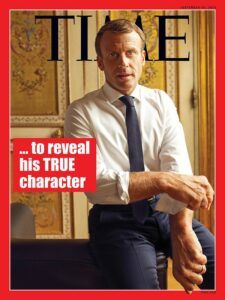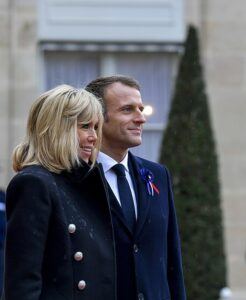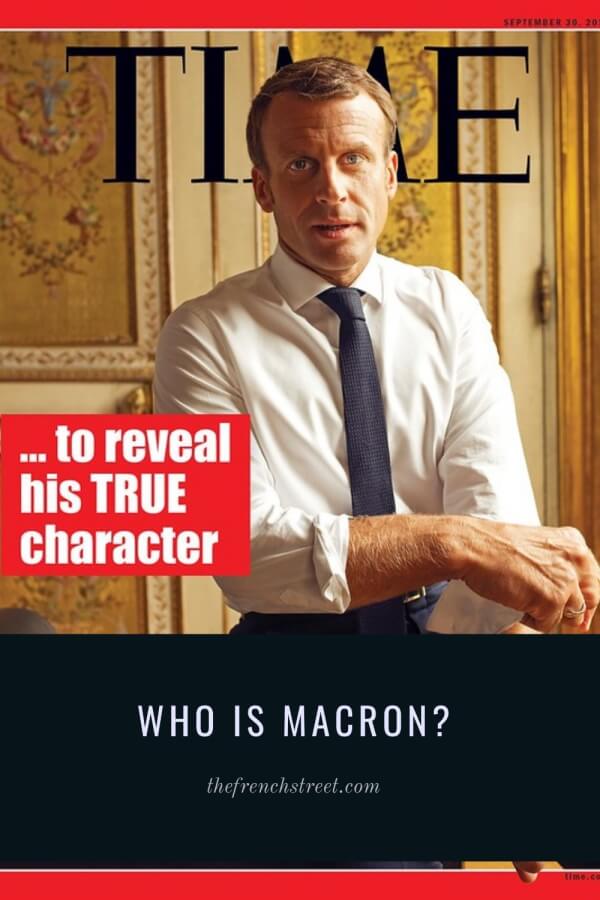Politics may not be everyone’s cup of tea, but it’s an unavoidable topic. We’re likely to hear about it at home, at work, or in the least expected places. During one of those times, you may have heard the name of Macron. Macron said this, Macron did that. But who is Macron?
Macron is unquestionably one of the most important political figures in the last few years. He is the president of France and is popular not only in France but all over the world too. He’s drawn attention from sectors of society that normally don’t care for politics or politicians for that matter.
Many people seem to be interested not only in his career as a politician but in his personal life as well. In fact, we could say he’s a celebrity. He’s not an actor or singer, but that doesn’t matter. Traditional media and social media have helped to increase his popularity and spark people’s interest.
Today we will provide some important details about Macron’s life so you can know who he is and why people seem to be interested in his life. C’est parti!
Early Life
His full name is Emmanuel Jean-Michel Frédéric Macron. He was born on December 21, 1977, in Amiens, a city in northern France. His parents are Françoise Macron, a physician, and Jean-Michel Macron, a professor of neurology at the University of Picardy. He has two siblings: Laurent and Estelle.
His great-grandfather was of English origin and a World War I hero. So, technically he is one-eighth British, although he didn’t know anything about it until recently.
He was raised in a non-religious family, but he asked to be baptized Catholic when he was 12.
He wanted to study at the École normale supérieure, one of the most prestigious universities in Paris but was rejected twice. Instead, he was admitted into the University of Paris-Ouest Nanterre La Défense, where he studied philosophy. He then obtained a master’s in public affairs at the Paris Institute of Political Studies.
Professional Career
Macron has held various jobs throughout his career. One of his first jobs was as an editorial assistant to Paul Ricoeur, a French Protestant philosopher.
After graduating in 2004, Macron became an Inspector of Finances in the Inspection générale des finances, which is a branch of the French Ministry. In 2007, he was appointed deputy rapporteur Jacques Attali’s “Commission to Unleash French Growth”.
Macron left his government job in 2008 due to the election of Nicolas Sarkozy as president. He became an investment banker at Rothschild & Cie Banque, one of the world’s largest financial companies. He was part of important deals like Nestlé’s acquisition of one of Pfizer’s largest subsidiaries in 2010.
Political Career
In 2012, Macron became the deputy secretary general of the Élysée. He quit in 2014 to create an investment firm that would fund educational projects. That same year, he declined the offer to be a candidate in the municipal elections in his hometown.
In August 2014, he replaced Arnaud Montebourg as the Minister of Economy and Industry. A year later he broke ties with his political party, the Socialist party, and became independent. This put a strain on his relationship with the government and tensions increased as many started to question his loyalty. He eventually created his own political party, En Marche, in April 2016, and resigned from his position in the cabinet in August of the same year. One of the main reasons for doing so was his opposition to some key socialist policies, including the 35-hour working week.
His Ascent to the Presidency
There was much speculation about Macron’s next move after his resignation, but it wasn’t until November 2016 that he officially announced he was running for president.
His campaign received considerable coverage from the media. It was reported that there were over 50 magazine covers dedicated to him. During his campaign, Macron stated that he was “neither left nor right,” but experts claim he has been slowly drifting toward the far right in efforts to survive.
On May 7, 2017, Macron crushed his opponent, Marine Le Pen, in the elections and was elected President of France. At 39, he became the youngest president in French history.
His Political Stances

During his first months as president, he pressed for reforms on public ethics, labor laws, taxes, and law enforcement agency powers.
One of his first moves was proposing a law banning elected representatives from hiring family members.
Regarding labor law and unions, he aimed to move toward a more flexible, consensus-driven system like the one in Germany and Scandinavian countries.
He supports better healthcare coverage that includes optics, hearing, and dental care.
He also supports giving more autonomy to schools and universities and increasing teachers’ salaries.
In 2018, Macron stated that there was no migrant crisis in Europe as compared to 2015, but he toughened measures in 2019 to control immigration in France and has been pushing for more control this 2020.
His economic plan, nicknamed the “Macronomy”, included reforms to unemployment and income and corporate taxes. However, it turned out that the losers in this plan were the poorest, the unemployed, and the retired. He has always opposed raising taxes on the highest earners. This earned him the nickname of “president of the rich” earlier this year.
He is a strong advocate of abortion and LGBT rights.
He is also a strong advocate of protecting the environment. In 2019, he stated he would block the EU-Mercosur Free Trade Agreement if Brazil didn’t commit to protecting the environment after the disastrous Amazon fires that same year.
One of his greatest challenges has been the war on terrorism and the integration of Muslim immigrants into French society. He has clashed with Muslim leaders in recent years due to his opinions about religion and freedom of speech involving Muhammad and Islam.
He has been described by some as Europhile and federalist. This has always been controversial since many French people believe he puts the EU’s interests ahead of France’s interests. Even though he denies this, the truth is he has always been one of the main and most influential figures in the European Union.
Personal Life

Macron’s personal life seems somewhat of a soap opera. He fell in love with Brigitte Trogneux, a high school teacher. He was 15, and she was 39 at the time. His parents tried to separate them by sending him away to Paris, but they reunited after his graduation. They became a couple when he was 18 and got married in 2007. They don’t have any children together.
Many sources claimed Macron was gay, particularly after the publication of a gay magazine in 2017 where he appeared topless on the cover. The cover read, “Coming out: a necessary fight”. However, it was later revealed that it had been photoshopped. He has always claimed he supports the LGBT community, but that he’s happily married to his wife Brigitte.
Macron is widely popular among women. His looks have drawn attention from gossip magazines like Elle and People, not to mention his name has constantly appeared on newspapers and social media, who named him one of the hottest politicians from around the world. There have even been polls that compare him to the Canadian Prime Minister, Justin Trudeau.
Macron enjoys sports like skiing, boxing, and tennis. He also loves football (soccer) and is a fan of the French club Olympique de Marseille.
He is proficient at playing the piano since he studied it for 10 years when he was younger. He particularly enjoys Schumann and Liszt.
As we mentioned earlier, he doesn’t have children of his own. In 2017, he and his wife Brigitte adopted Nemo, a black Labrador. They all live together in the Élysée Palace.
He is constantly portrayed on social media for various reasons. One of his most remembered incidents was when he scolded a teenager for calling him Manu. You can watch the video below.
Final Thoughts
As you can see, Macron is quite a character. He is loved and admired by many but loathed by others as well.
The next presidential election will take place in 2022, so we will still hear from Macron for at least two more years…if he’s not reelected then.
His looks, his personality, and his opinions have earned him a privileged place in history. Maybe other leaders before him might equal or surpass him in popularity and other aspects, but social media didn’t exist back then. Who knows?
Did you know Macron? What do you think about him? Let me know in the comments below. Au revoir, les amis!
*Featured image credit: Kremlin.ru, CC BY 4.0 , via Wikimedia Commons.



I’m not into politics but I like Macron, to me, he is a character. And we have some things in common: I also played piano for 10 years and my boyfriend is also much younger than me. Not that much, but enough to be out of the normal age difference between partners. But when it’s the right one for you, age doesn’t matter.
I like reading biographies of interesting and successful people, so I enjoyed this one as well. Thanks for sharing this!
Hi, Lenka,
I agree with you. Macron is quite a character. Even if someone is not into politics, there is something in him that seems to draw everybody’s attention.
Age is just a number. Unfortunately, many people make fun of couples when there is a significant age difference.
Thanks for commenting.
He’s a guy that we like in Sweden and according to your article, he seems to be a great president for France as well.
“He also supports giving more autonomy to schools and universities and increasing teachers’ salaries.” Very well done I might say because teachers over the world are so underpaid in my opinion if you think of what they are doing.
Did not expect to find this article but I am glad I did, well written and interesting.
Cheers
Hi, Tobias,
It doesn’t surprise me as he seems to be very popular all over the world.
Yes, I do agree with you regarding teachers’ salaries. In most countries, they’re underpaid. It’s one of the most important professions there are, and as such, the pay should be accordingly.
Thanks for commenting.